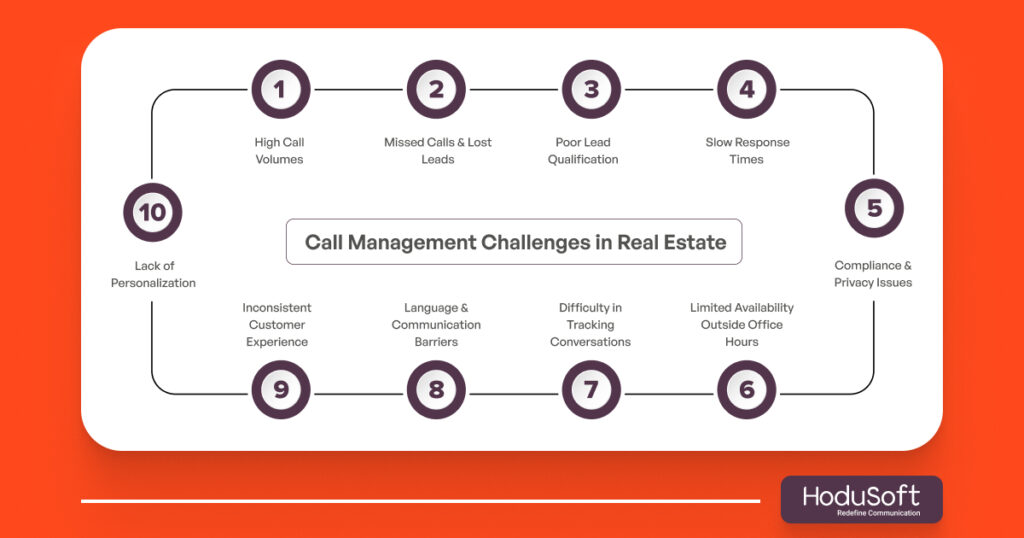Why Real Estate Needs AI-Powered Call Centers?
Effective communication. Unwavering trust. Strong interpersonal relationships. These have always been the foundation for the real estate industry. And always will be.
However, thanks to technological innovation, the sector is undergoing rapid transformation. Clients expect faster responses, personalized service, and seamless experiences across every interaction.
To meet these rising demands and stay competitive, real estate companies must adopt innovative technologies — and AI-powered call centers are at the forefront of this transformation. After the advent of generative AI, the future of the real estate sector looks bright.
In this blog post, we will discuss the common challenges real estate companies face while managing calls, the role AI-powered call center solutions play in overcoming the challenges, and the best practices for implementing AI-powered call centers.
So, without further ado let’s explore why the future of property sales depends on integrating AI-powered call center solutions, and how these systems are redefining success in the real estate market.
Challenges Real Estate Companies Face While Managing Calls

From the sheer magnitude of call volume to customer experience, real estate companies face several challenges as far as managing calls is concerned. Here are some of the challenges.
1. High Call Volumes
This is a huge challenge. Especially in commercial real estate and residential real estate sectors. During peak market seasons, many companies in the real estate industry struggle with high call volumes.
Managing inquiries related to property listings and property management becomes overwhelming. The huge call volumes put a huge pressure on real estate call centers and force prospective customers to drop out from the call.
2. Missed Calls and Lost Leads
Every missed call means a missed sale opportunity. Real estate companies and real estate firms often face the costly problem of missed calls. Whether the queries are from potential buyers and clients, they must be captured.
Many real estate firms struggle to capture every inquiry effectively. And the calls that are lost are gone for good. No matter whatever they do, the lost leads aren’t going to return.
3. Poor Lead Qualification
This is a huge challenge in the real estate industry. This happens due to the lack of a proper pre-screening system during calls. It results in real estate agents and real estate professionals spending valuable time pursuing low-quality leads.
In a sector, where time is far more valuable than money, this can be extremely detrimental for businesses. Efficient screening processes and automated lead generation can enhance lead qualification and optimize agent productivity.
4. Inconsistent Customer Experience
In today’s competitive real estate landscape, it’s crucial to provide consistent client interactions. This is an area where many real estate companies struggle. That’s when the customer experience and customer satisfaction goes for a toss.
Providing consistent customer experience is difficult without standardized processes. Without standardized call handling procedures, customer service quality can vary significantly between agents.
5. Difficulty in Tracking Conversations
Many real estate firms struggle with tracking conversations. That happens when they don’t have proper access to historical data and property data. Without the right tools, important client details discussed over the phone can get lost.
Real estate companies must make sure that they have the right tools to track customers’ conversations and analyze every customer interaction in an efficient manner.
6. Slow Response Times
Delayed responses, not following up immediately, and inability to return missed calls can frustrate clients and prospects. This is an area where real estate companies can improve.
To succeed in a highly competitive environment, real estate agents and real estate business organizations must minimize slow response times. They should leverage sophisticated technology to enhance response time and stay ahead of competitors.
7. Limited Availability Outside Office Hours
Real estate professionals often lose potential business because of limited availability after regular hours. Some people prefer to call after work hours. But if companies lack systems to manage or route these calls efficiently, they will lose the clients and prospects to their competitors.
Thankfully, in today’s era, tools such as modern AI solutions, generative AI tools, and virtual assistants provide 24/7 support for prospective clients. By leveraging these tools real estate companies can ensure availability well beyond office hours.
8. Language and Communication Barriers
This is a challenge for those real estate companies that have global presence. For them, language barriers can lead to misunderstandings and poor service delivery.
Communication barriers are detrimental for real estate companies. It not only can alienate international clients and prospects but also have a negative impact on brand name.
9. Lack of Personalization
In the dynamic real estate market, personalized service is crucial when discussing property valuation and property values. When agents don’t have access to customer history during calls, conversations feel generic instead of tailored.
The lack of personalized communication can disrupt sales and service accuracy. When real estate companies lack personalization, they risk losing client trust, missing key deals, and delivering experiences that fail to meet individual client needs.
10. Compliance and Privacy Issues
Effective property management and tenant retention strategies are key for staying compliant in today’s business world. Handling sensitive client information over calls requires adherence to privacy laws.
It can be challenging without proper protocols. Governance compliance laws require real estate companies to handle client data responsibly.
How AI-Powered Call Center Solutions Help Real Estate Companies Manage the Challenges
The real estate industry faces several communication and operational hurdles when managing client calls, from high volumes to missed opportunities and inconsistent service experiences.
AI-powered call center solutions are reshaping how real estate companies overcome these challenges, ensuring faster responses, better customer engagement, and smarter lead management.
1. Managing High Call Volumes Efficiently
AI call centers use virtual assistants and AI tools to handle large numbers of inquiries simultaneously, especially during busy property seasons.
By offering virtual reality tours and instant information through chatbots, they reduce the burden on human agents and improve customer satisfaction.
2. Reducing Missed Calls and Capturing More Leads
Automated call routing, automated lead generation, and AI solutions ensure that every potential buyer or client inquiry is recorded and responded to.
This prevents lost sales opportunities and ensures that the real estate firms can engage every prospect efficiently.
3. Improving Lead Qualification
Machine learning and natural language processing technologies analyze caller behavior and conversations in real-time.
This helps agents focus only on high-quality leads, ensuring better conversions and smarter investment in real estate sales and property management.
4. Delivering Consistent Customer Experiences
AI call centers standardize conversations, ensuring every caller gets professional and personalized service.
By using client interactions data and offering personalized property recommendations, firms boost customer engagement across all touchpoints.
5. Tracking and Recording Conversations Seamlessly
AI technology can automatically record, transcribe, and analyze conversations.
Access to historical data and property data helps real estate teams follow up accurately and make data-driven decision making possible.
6. Accelerating Response Times
AI-enabled systems eliminate the traditional lag in call-backs and inquiries.
By utilizing virtual assistants and predictive tools, real estate firms can respond instantly, thereby staying competitive in a rapidly expanding AI ecosystem.
7. Extending Support Beyond Office Hours
AI-powered virtual agents provide 24/7 support, handling late-night inquiries from international buyers and local clients alike.
This constant availability ensures that real estate professionals never miss a deal, even after business hours.
8. Overcoming Language and Communication Barriers
Advanced natural language processing allows AI systems to converse fluently in multiple languages.
This enables real estate companies to serve a diverse client base, addressing communication barriers effectively.
9. Offering Hyper-Personalized Services
AI helps real estate businesses personalize offers based on property valuation, property searches, and client preferences.
Tools like gen AI and AI-powered property recommendations ensure that buyers feel understood and valued.
10. Ensuring Compliance and Protecting Client Data
AI solutions help real estate companies maintain compliance with governance compliance laws by safely storing and processing sensitive data.
Automated systems ensure that personal and financial data related to how much rent, property images, or net operating income is handled securely, protecting both clients and businesses.
Best Practices for Implementing AI-Powered Call Centers by Real Estate Companies
Adopting AI-powered call center solutions offers real estate companies a powerful advantage in managing client interactions, lead generation, and service efficiency. However, successful implementation requires a strategic approach to fully unlock the potential of artificial intelligence in the real estate industry. Here are the best practices real estate firms should follow:
1. Clearly Define Goals and KPIs
Before selecting an AI-driven call center software, identify what you want to achieve. Is it faster response times? Higher lead conversions? Better client retention? Or improved tracking of property data? Setting clear KPIs helps measure the success of your AI adoption against the real estate business objectives.
2. Choose the Right Solutions Provider
Not all AI solutions are created equal. No two solutions providers are alike to each other. That’s why choosing the right one is all the more important. In the highly crowded market, selecting the right provider can be overwhelming. Select a provider that has a proven track record in engineering real estate call centers solutions.
3. Integrate AI with Existing CRM and Property Management Systems
Ensure seamless integration between your AI-powered call center and your existing CRM, property management software, and property listings databases. This allows agents to access historical data, property valuation information, and client inquiries instantly during interactions. It will also enable you to align with your company’s unique needs.
4. Personalize Client Interactions Using AI Insights
Use AI to capture and analyze customer behavior for offering personalized property recommendations, real-time market insights, and estimate property values. Tailored interactions increase customer engagement and boost trust among potential buyers and real estate investors.
5. Invest in Training and Change Management
Train real estate agents and real estate professionals to work alongside AI systems effectively. Offer workshops on using AI-powered tools, interpreting AI-driven insights, and managing AI-assisted conversations to ensure a smooth transition.
6. Focus on Data Security and Compliance
Compliance with governance compliance laws is critical. Use AI solutions that offer end-to-end encryption, secure client data storage, and regular compliance audits to protect sensitive information like net operating income, property images, and rent price data.
7. Monitor, Analyze, and Optimize Regularly
Continuously monitor AI system performance through analytics dashboards. Use data-driven decision making to optimize scripts, workflows, and customer journeys, ensuring your investment strategies and marketing efforts stay relevant.
8. Ensure Multi-Channel Client Support
An AI-powered call center should offer support beyond voice calls — integrating live chat, email, social media, and virtual reality tours helps manage client inquiries across all touchpoints.
9. Embrace Scalability for Growing Business Needs
As your real estate company gains more clients and enters new markets, your AI solution should scale effortlessly. Look for AI tools and platforms built to grow with your needs, supporting new revenue streams and handling competitive market demands.
10. Stay Updated with the Rapidly Expanding AI Ecosystem
The world of gen AI, ai in real estate, and ai powered solutions is evolving quickly. Stay informed about emerging tools like virtual assistants, augmented reality, and automated lead generation to stay ahead and continuously innovate your service delivery.
Taking Everything Into Consideration,
As real estate companies adapt to new market realities, AI-powered call centers will become essential, not optional.
They offer the speed, intelligence, and personalization required to meet modern client expectations and fuel property sales growth.
For real estate professionals ready to stay ahead, investing in AI is no longer just a technological upgrade — it’s a business imperative. The future of property sales is intelligent, agile, and AI-driven.



